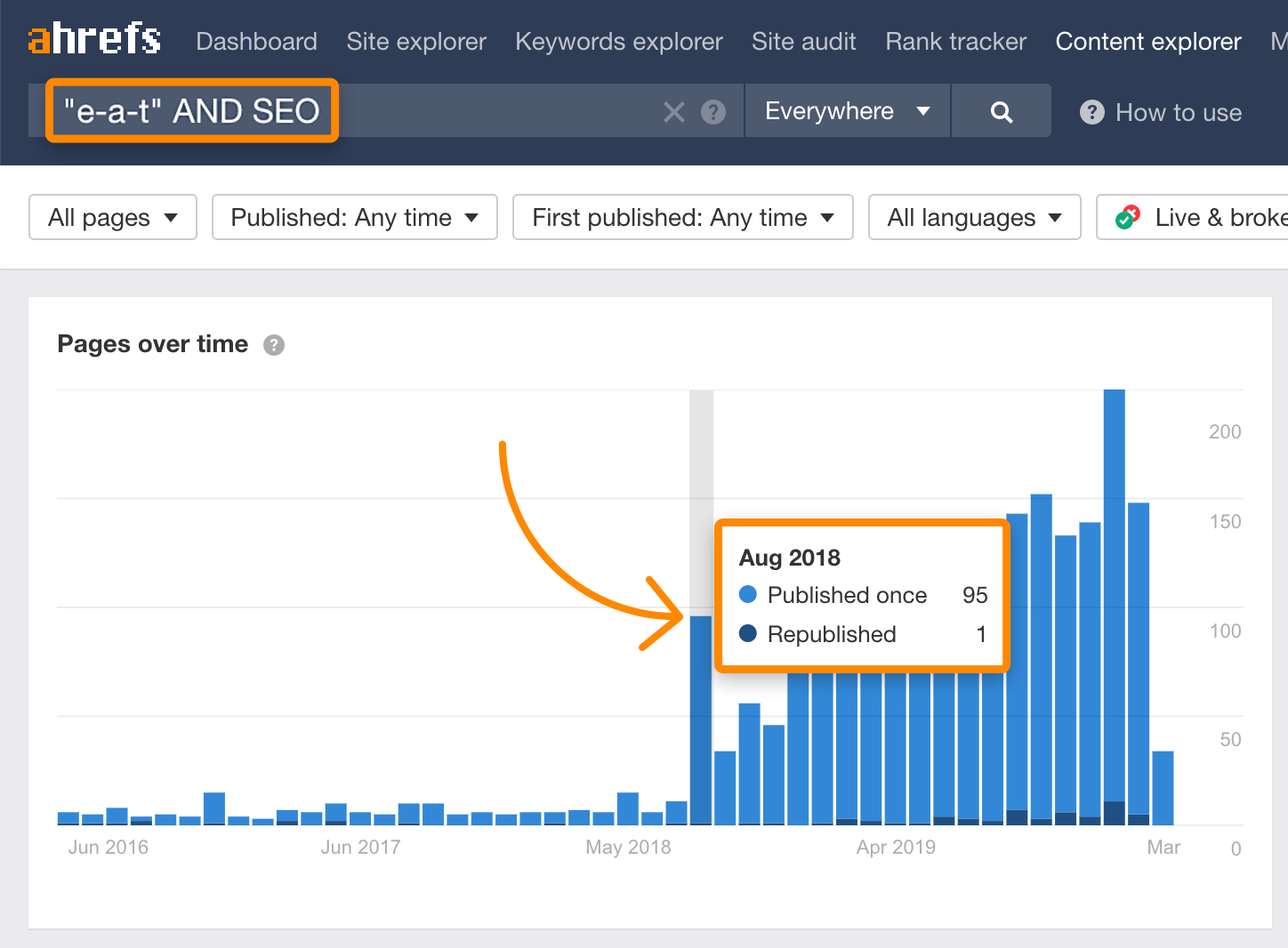
Some of these articles tell us it’s an important ranking factor…

… while others tell us it isn’t:
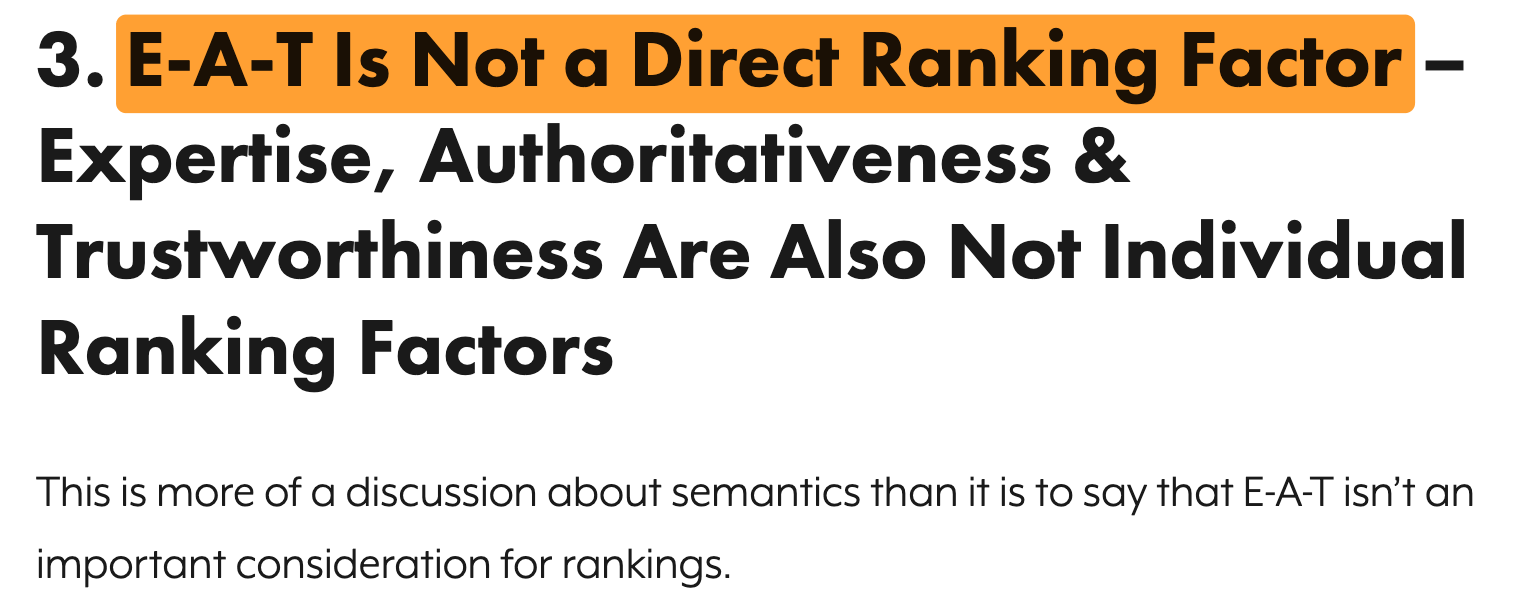
So what’s the truth?
In this guide, we’ll answer the following questions:
- What is E-A-T?
- How important is E-A-T?
- How is E-A-T evaluated?
- Is E-A-T a ranking factor?
- Do websites have an E-A-T- score?
- How to improve and demonstrate E-A-T
E-A-T- stands for expertise, authoritativeness, and trustworthiness. It comes from Google’s Search Quality Rater Guidelines—a 168-page document used by human quality raters to assess the quality of Google’s search results.
Google published this document online in 2013 to “help webmasters understand what Google looks for in a web page.”
E-A-T is important for all queries, but some more so than others.
If you’re just searching for pictures of cute cats, then E-A-T probably doesn’t matter that much. The topic is subjective, and it’s no big deal if you see a cat you don’t think is cute.
If you’re searching for the correct dosage of aspirin when pregnant, on the other hand, then E-A-T is undoubtedly important. If Google were to surface content on this topic written by a clueless writer, published on an untrustworthy website that lacks authority, then the probability of that content being inaccurate or misleading is high.
Given the nature of the information being sought here, that’s not just mildly inconvenient—it’s potentially life-threatening.
E-A-T is also important for queries like “how to improve credit score.” Here, advice from the clueless and unauthoritative is unlikely to be legit and shouldn’t be trusted.
Google refers to these kinds of topics as YMYL (Your Money or Your Life) topics:
Some types of pages or topics could potentially impact a person’s future happiness, health, financial stability, or safety.
We call such pages “Your Money or Your Life” pages, or YMYL.
If your site is built around a YMYL topic, then demonstrating EAT is crucial.
Expertise, authoritativeness, and trustworthiness are similar concepts—but not identical. So, they’re each evaluated independently using a different set of criteria.
Expertise
Expertise means to have a high level of knowledge or skill in a particular field. It’s evaluated primarily at the content-level, not at the website or organizational level. Google is looking for content created by a subject matter expert.
For YMYL topics, this is about the formal expertise, qualifications, and education of the content creator. For example, a chartered accountant is more qualified to write about tax preparation than someone who’s read a few posts at r/personalfinance.
Formal expertise is important for YMYL topics such as medical, financial, or legal advice.
For non-YMYL topics, it’s about demonstrating relevant life experience and “everyday expertise.”
Some topics require less formal expertise. […] If it seems as if the person creating the content has the type and amount of life experience to make him or her an “expert” on the topic, we will value this “everyday expertise” and not penalize the person/webpage/website for not having “formal” education or training in the field.
Google also says that “everyday expertise” is enough for some YMYL topics. For example, take a query like “what does it feel like to have cancer.” Someone living with the disease is better placed to answer this than a qualified doctor with years of experience.
It’s even possible to have everyday expertise in YMYL topics. For example, there are forums and support pages for people with specific diseases. Sharing personal experience is a form of everyday expertise.
Authoritativeness
Authority is about reputation, particularly among other experts and influencers in the industry. Quite simply, when others see an individual or website as the go-to source of information about a topic, that’s authority.
To evaluate authority, raters search the web for insights into the reputation of the website or individual.
Use reputation research to find out what real users, as well as experts, think about a website. Look for reviews, references, recommendations by experts, news articles, and other credible information created/written by individuals about the website.
Raters are told to look for independent sources when doing this.
When searching for reputation information, try to find sources that were not written or created by the website, the company itself, or the individual.
Wikipedia is one good source of information that Google mentions.
Wikipedia articles can help you learn about a company and may include information specific to reputation, such as awards and other forms of recognition, or also controversies and issues.
It’s important to remember that authority is a relative concept. While Elon Musk and Tesla are authoritative sources of information about electric vehicles, they have little to no authority when it comes to SEO.
It’s also the case that some people and websites are uniquely authoritative when it comes to certain topics. For example, the most authoritative source of lyrics to Coldplay songs is their official website. And the most authoritative source of information for beef grades in the US is the USDA.
Trustworthiness
Trust is about the legitimacy, transparency, and accuracy of the website and its content.
Raters look for a number of things to evaluate trustworthiness, including whether the website states who is responsible for published content. This is particularly important for YMYL queries, but applies to non-YMYL queries too.
YMYL websites demand a high degree of trust, so they generally need satisfying information about who is responsible for the content of the site.
Having sufficient contact information is also important, especially for YMYL topics and online stores.
If a store or financial transaction website has just an email address and physical address, it may be difficult to get help if there are issues with the transaction. Likewise, many other types of YMYL websites also require a high degree of user trust.
Raters also take into account content accuracy.
For news articles and information pages, high quality MC must be factually accurate for the topic and must be supported by expert consensus where such consensus exists.
Citing trustworthy sources is part of this.
[an article] with a satisfying amount of accurate information and trustworthy external references can usually be rated in the High range.
Just remember that trust, like authoritativeness, is a relative concept. People and websites can’t be perceived as trustworthy in all areas. We’re a trustworthy source of information about SEO, but not bodybuilding.
Kind of, at least according to Google’s Public Liaison of Search, Danny Sullivan:
Is E-A-T a ranking factor? Not if you mean there’s some technical thing like with speed that we can measure directly.
We do use a variety of signals as a proxy to tell if content seems to match E-A-T as humans would assess it.
In that regard, yeah, it’s a ranking factor.— Danny Sullivan (@dannysullivan) October 11, 2019
Confused? Let me explain.
You see, for something to be a “ranking factor,” it has to be something tangible that a computer can understand and evaluate.
Perhaps the most obvious example of this is the number of backlinks to a page.
Google crawls the web far and wide so they know how many backlinks point to most pages. They can easily create a computer program that ranks pages with the most high-quality backlinks.
The problem with expertise, authoritativeness, and trust is that—while they’re desirable qualities of content—they’re fundamentally human concepts. You can’t tell a computer to rank pages with E-A-T higher because it only understands bits and bytes.
Here’s Google’s solution to this problem:
First, their search engineers think of algorithm tweaks that might improve search result quality.
Second, they show search results to Quality Raters with and without the proposed change implemented. Their job is to provide feedback to Google, and they aren’t told which set of results is which.
Third, Google uses the feedback to decide whether the proposed tweak had a positive or negative impact on search results. If the results are positive, the change is implemented.
Using this process, Google engineers are able to understand the tangible signals that align with E-A-T and adjust the ranking algorithms accordingly.
Google explains more about this process here, and in this video:
Ben Gomes, Google’s Vice President of Search, offered a fantastic tldr; version of everything above in an interview with CNBC in 2018:
You can view the rater guidelines as where we want the search algorithm to go. They don’t tell you how the algorithm is ranking results, but they fundamentally show what the algorithm should do.
No. (Finally, a question with a definitive answer).
“EAT and YMYL are concepts introduced for Quality Raters to dumb down algorithm concepts. They are not ‘scores’ used by Google internally.“ #Pubcon @methode Followup: There is no EAT algorithm.— Grant Simmons (@simmonet) October 10, 2019
This answer is quite obvious when you understand how Google evaluates E-A-T, and the role of the Quality Raters. But it’s definitely worth reiterating nonetheless:
Google does not give your website an E-A-T score.
That said, there are still ways to improve your expertise, authoritativeness, and trust in the eyes of Quality Raters.
First, it’s important to understand that demonstrating and improving E-A-T are two different things.
You can’t demonstrate E-A-T if you don’t have it—and that’s the first hurdle to overcome.
Lack of E-A-T is thought to be why many YMYL sites dropped like a stone in August 2018 when Google rolled out their now infamous “medic” update.
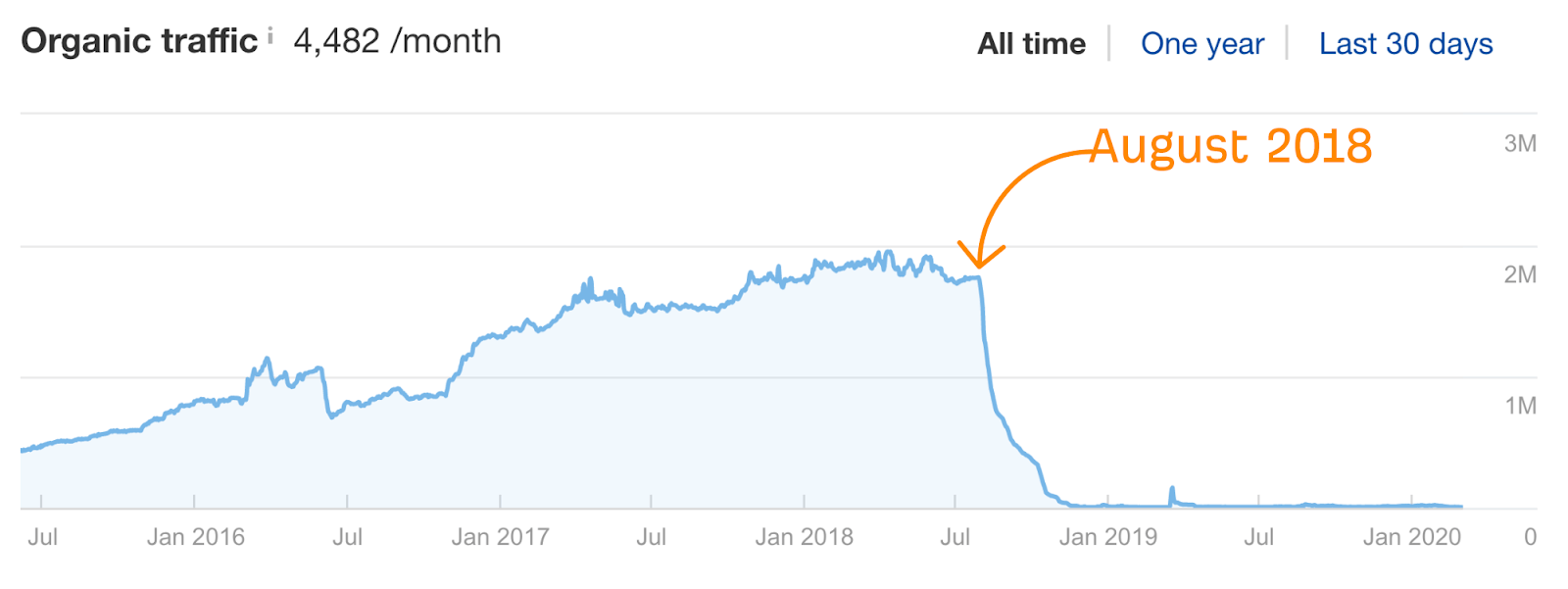
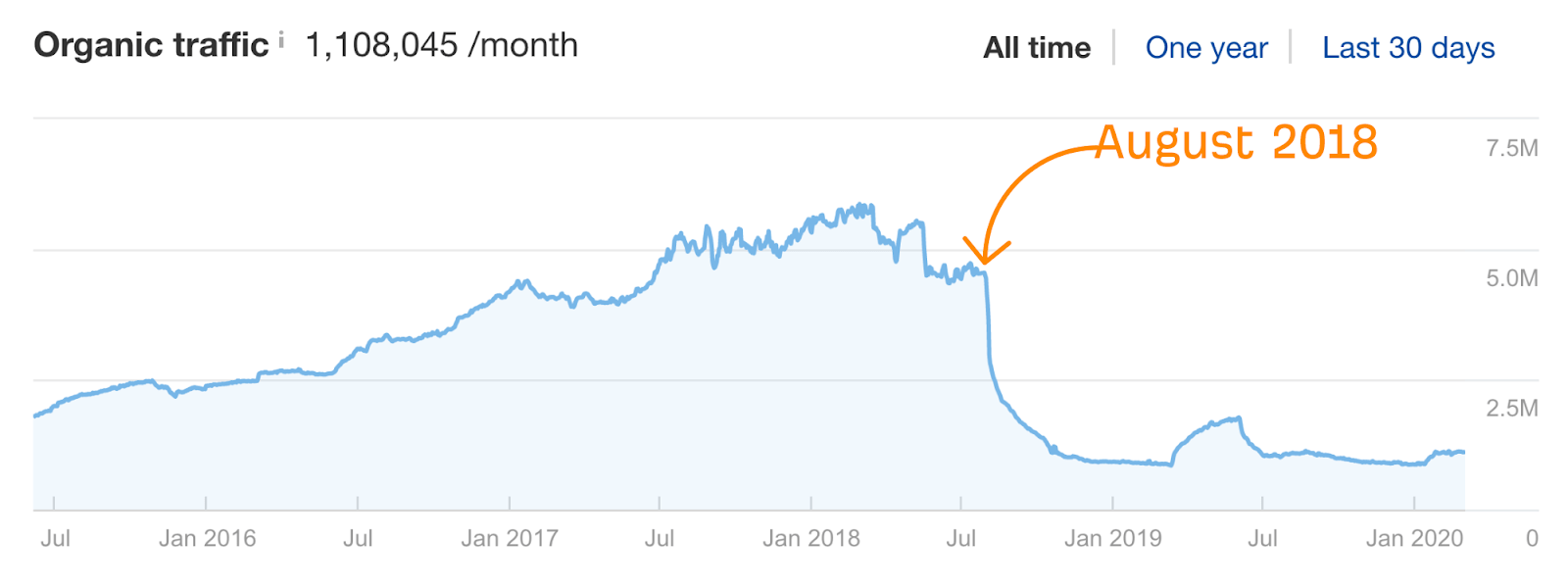
Because many of these sites had almost no E-A-T in the first place, traffic dropped when the core update rolled out and Google’s ability to algorithmically detect E-A-T improved.
If you were one of these sites, or just want to safeguard for the future, making an effort to improve and better demonstrate your E-A-T to Google is a wise move.
Here are some ways to do that:
1. Build more links
Despite there being no mention of links in Google’s Search Quality Rater Guidelines, Gary Illyes, a Google Webmaster Trends Analyst, has said that E-A-T is largely based on links and mentions from authoritative sites.
I asked Gary about E-A-T. He said it’s largely based on links and mentions on authoritative sites. i.e. if the Washington post mentions you, that’s good.
He recommended reading the sections in the QRG on E-A-T as it outlines things well.@methode #Pubcon— Marie Haynes (@Marie_Haynes) February 21, 2018
According to Marie Haynes, he also said that Google is really good at understanding which links count, so make sure you’re prioritising the building of high-quality links over low-quality ones.
Read more about that here, or watch this video:
2. Keep content up to date
If you’re covering YMYL topics like medical or financial advice, then keeping content updated is crucial for demonstrating E-A-T.
High E-A-T financial advice, legal advice, tax advice, etc., should come from trustworthy sources and be maintained and updated regularly.
High E-A-T medical advice or information should be written or produced in a professional style and should be edited, reviewed, and updated on a regular basis.
But what about non-YMYL topics?
The QRGs don’t talk about this specifically, but we believe it’s still important. After all, how can a page be trustworthy if it misleads readers with outdated information?
3. Check the facts
Google’s Quality Rater Guidelines say that news articles must be factually accurate to demonstrate a high level of E-A-T.
High E-A-T news articles should be produced with journalistic professionalism—they should contain factually accurate content […]
It’s the same story for scientific content; it should be factually accurate and align with the consensus of the scientific community.
High E-A-T information pages on scientific topics should be produced by people or organizations with appropriate scientific expertise and represent well-established scientific consensus on issues where such consensus exists.
But again, what about other topics?
Although the QRGs don’t talk about accuracy any further in the context of E-A-T, we can assume it’s important because the document mentions it a further 50+ times.
So, our advice is to fact-check your content, ideally against sources that Google trusts like Wikipedia and Wikidata.
You should also make sure you’re citing legit resources.
4. Get more reviews
Google tells Quality Raters to use online reviews as a source of reputation information about businesses, which relates to trust and authority.
For businesses, there are many sources of reputation information and reviews. […] You can try searching on specific sites to find reviews.
Lots of people get hung up with this one, and often try to oversimplify things by focusing on one particular review site—namely the Better Business Bureau.
It’s obvious why this happens, because the rater guidelines say things like:
Please consider very low ratings on the BBB site to be evidence for a negative reputation.
However, the notion of BBB reviews as a ranking factor has been pretty much debunked
Instead, focus on getting more positive online reviews, across the board, on the sites that matter—i.e., the sites that people use and trust in your industry. For a restaurant, that might be TripAdvisor, or even a popular local food blog.
5. Hire experts
Experts are in plentiful supply in all industries, so why not hire them to write for your site?
This is pretty much a mandatory requirement if you’re covering YMYL topics.
Formal expertise is important for YMYL topics such as medical, financial, or legal advice.
But hiring folks with formal expertise isn’t necessary for non-YMYL topics.
Instead, you can hire people with a proven track record in the industry, or those who are already well-known for creating high-quality content on the topic.
Expertise may be less formal for topics such as recipes or humor. An expert page on cooking may be a page on a professional chef’s website, or it may be a video from an expert content creator who uploads very high quality cooking videos on YouTube and is one of the most well-known and popular content creators for recipes in their area of expertise.
If you can’t afford to hire people, you can always interview an expert or have them write a guest post for your site.
We did this for our guide to Google penalties:
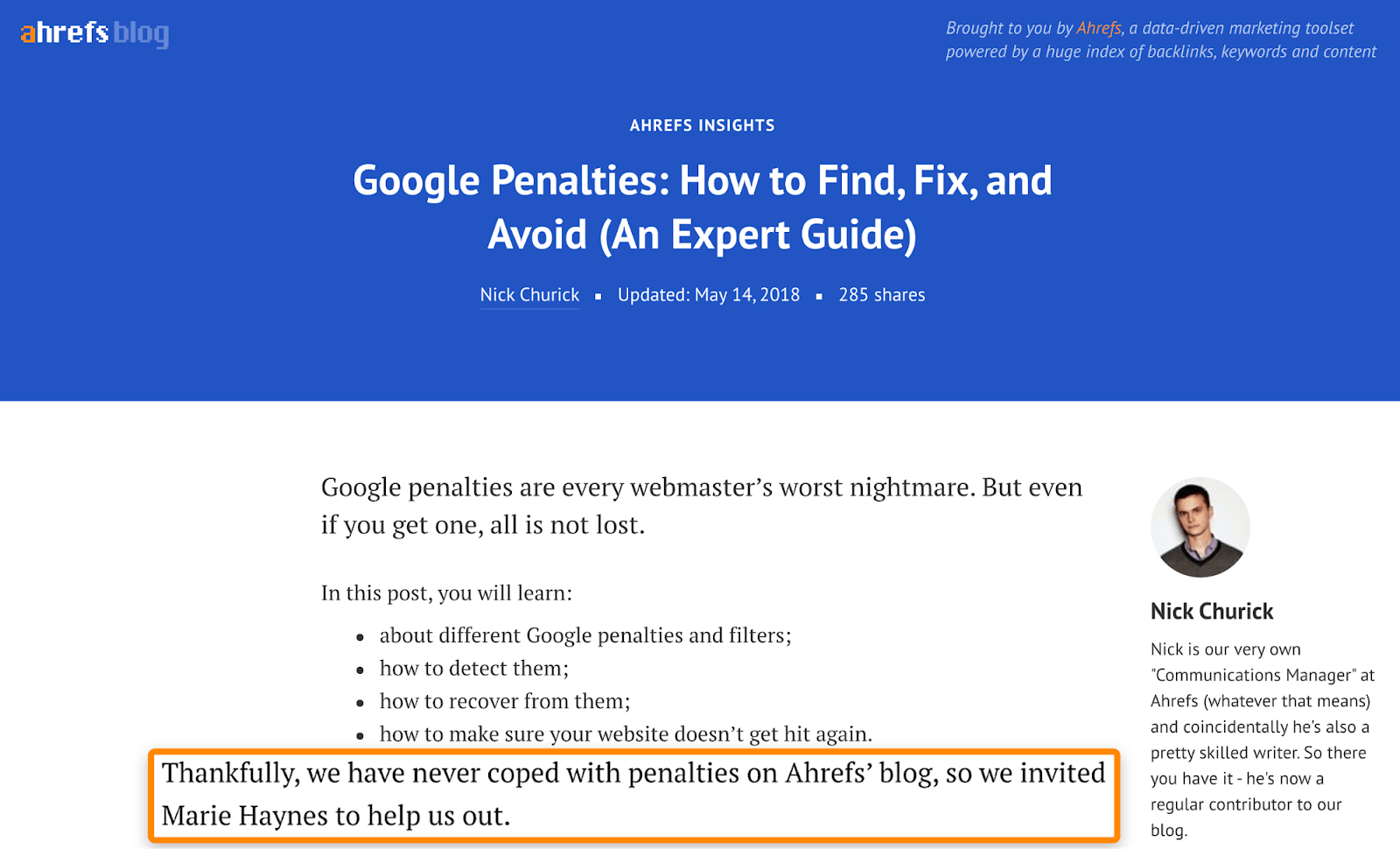
6. Flash your credentials
Most people don’t like to brag, but when it comes to demonstrating E-A-T to Google, this is precisely what you should do. If you have a PhD, have spoken at well-known industry conferences, or have won prestigious industry awards, let the world (and Google) know.
There are two obvious places you can do this. The first is your author bio.
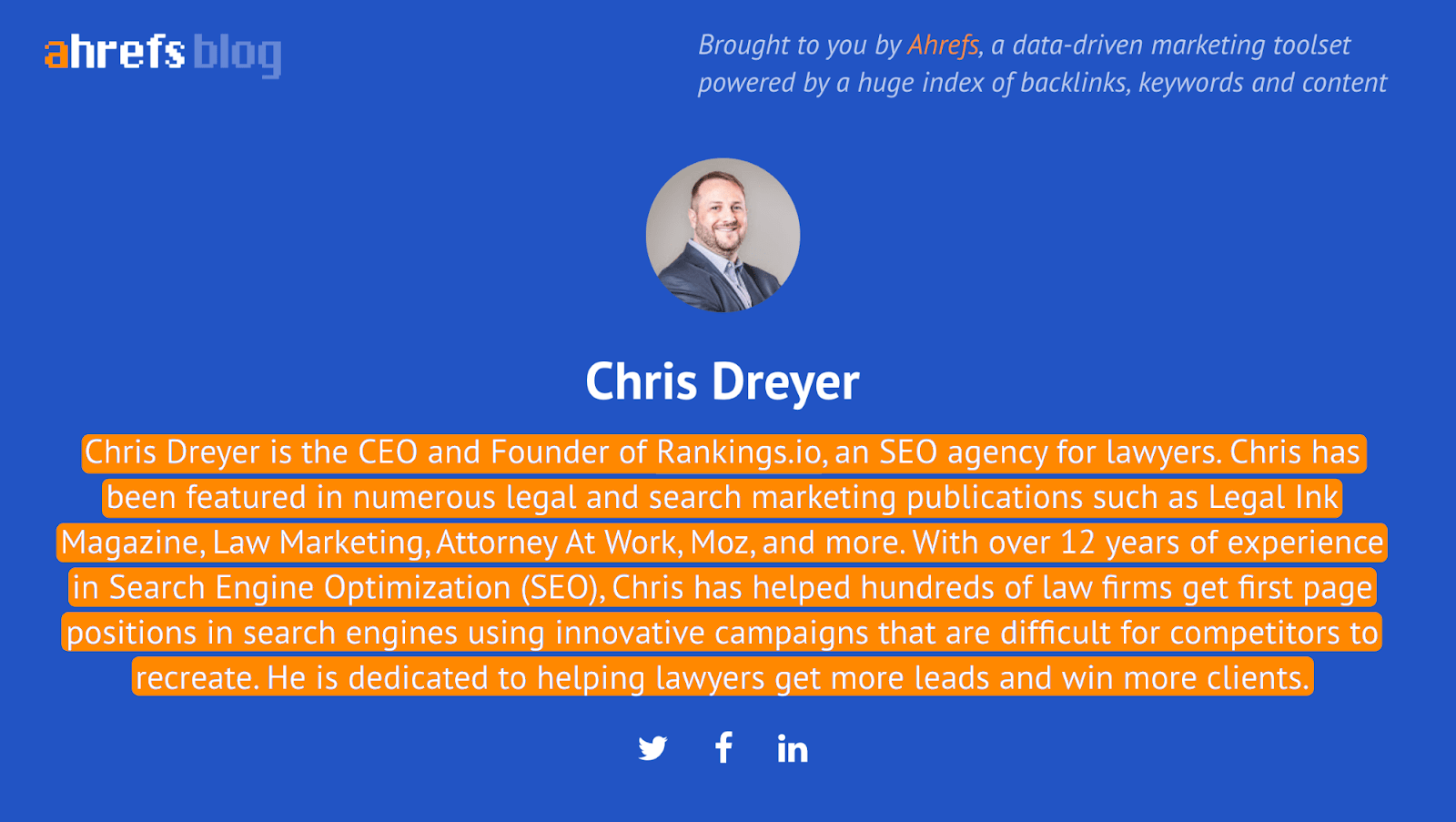
The second is your “About” or “Team” page:
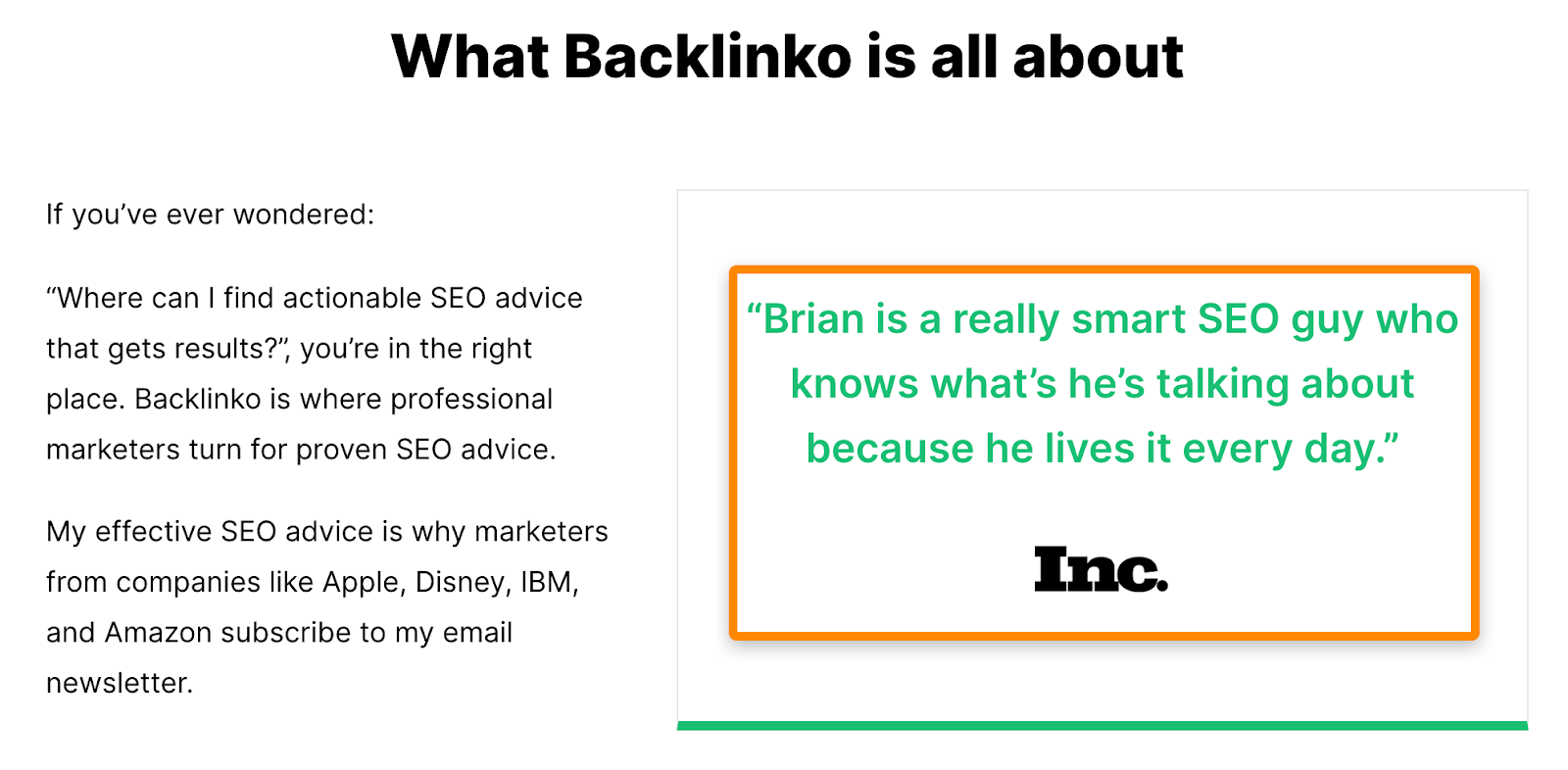
Remember, the point of this is to demonstrate your expertise, authority, and trustworthiness to Google. Don’t exaggerate or embellish the truth.
You might also want to consider using schema markup to provide information about achievements and expertise in a more structured way.
<script type="application/ld+json">
{
"@context": "http://www.schema.org",
"@type": "Person",
"name": "Mark Zuckerberg",
"alumniOf": [
{
"@type": "CollegeOrUniversity",
"name": "Harvard University",
"sameAs": "https://en.wikipedia.org/wiki/Harvard_University"
},
],
7. Show contact details
Businesses that fail to give visitors sufficient contact and customer support information may be perceived as untrustworthy. This is especially important for YMYL pages.
For websites with YMYL pages, such as online banks, we expect to find a lot of information about the site, including extensive customer service information. […] Users need a way to ask questions or get help when a problem occurs.
Our opinion is that legit businesses should at least showcase their address, phone number, email address, and point of contact.
But, what if you’re a solo blogger or work from home?
Don’t worry, Google’s Quality Raters aren’t going to penalize you for not displaying your home address or providing 24/7 customer support. That would be unreasonable. The QRGs state that the level of expected transparency depends on the site.
For example, humor websites may not need the level of detailed contact information we would expect from online banking websites.
8. Get a Wikipedia page
Wikipedia receives a few mentions in the QRG, and Quality Raters are told to look specifically to the encyclopedia to help assess reputation.
News articles and Wikipedia articles can help you learn about a company and may include information specific to reputation, such as awards and other forms of recognition, or also controversies and issues.
But, there’s a problem: Getting a Wikipedia page is hard. Really hard.
Unless you’re already an authority in your industry, which means having significant coverage in reliable and independent sources, getting a Wikipedia page is next to impossible. We don’t even have one.
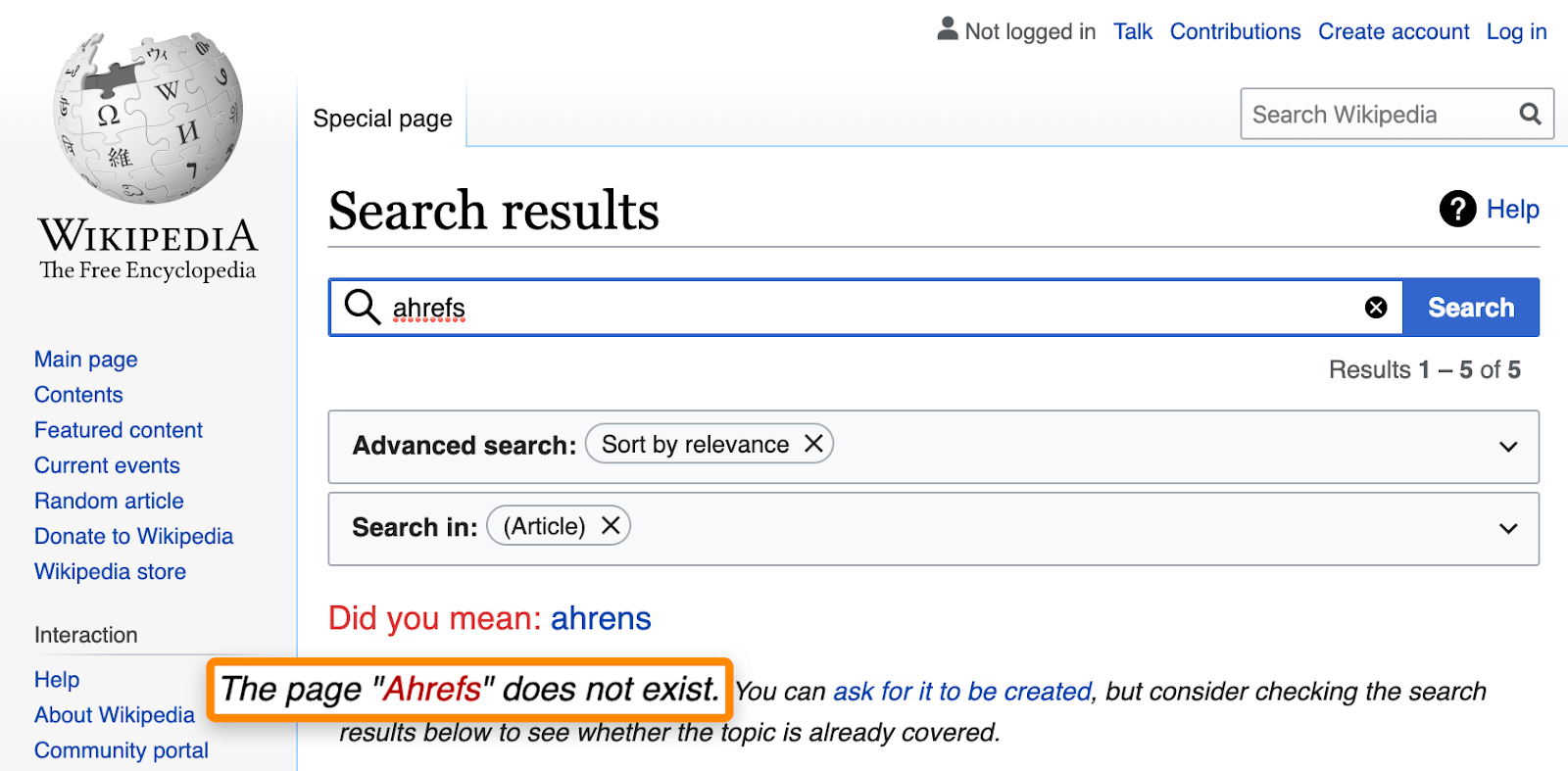
However, if you feel your business has garnered enough authority to warrant a Wikipedia page, and you don’t yet have one, it’s definitely worth shooting for one.
For the rest of us, the next best thing is getting cited on an existing Wikipedia page.

Unfortunately, this isn’t that easy either. While it is possible to edit Wikipedia pages, self-promotional suggestions are usually removed. That said, it’s worth a try if you have a genuinely useful resource that would add value to a particular article on Wikipedia.
9. Get more mentions
Mentions on well-known industry websites can help to improve your authority—assuming they’re positive. Quality Raters are told to look for these when assessing the reputation of the website and author.
Look for reviews, references, recommendations by experts, news articles, and other credible information created/written by individuals about the website.
For example, when my name gets mentioned editorially on Search Engine Journal, that may help demonstrate my authority on the topic of SEO.
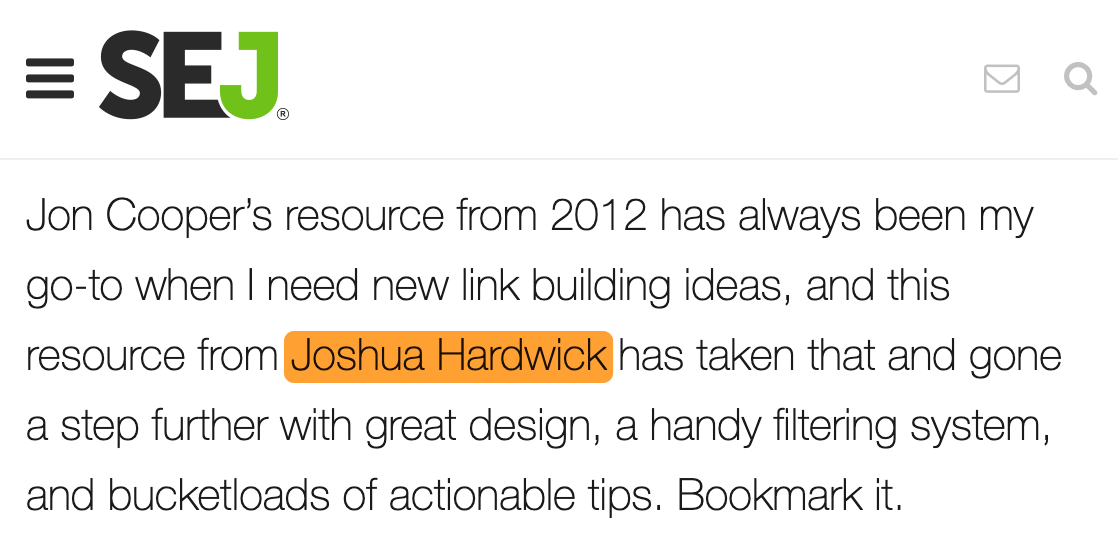
The problem is that getting authoritative mentions is a bit of a catch 22. Mentions increase authority, but you need authority to get mentions.
That said, there are a couple of things you can do.
The first is to publish unique insights and data that others in your industry will reference.
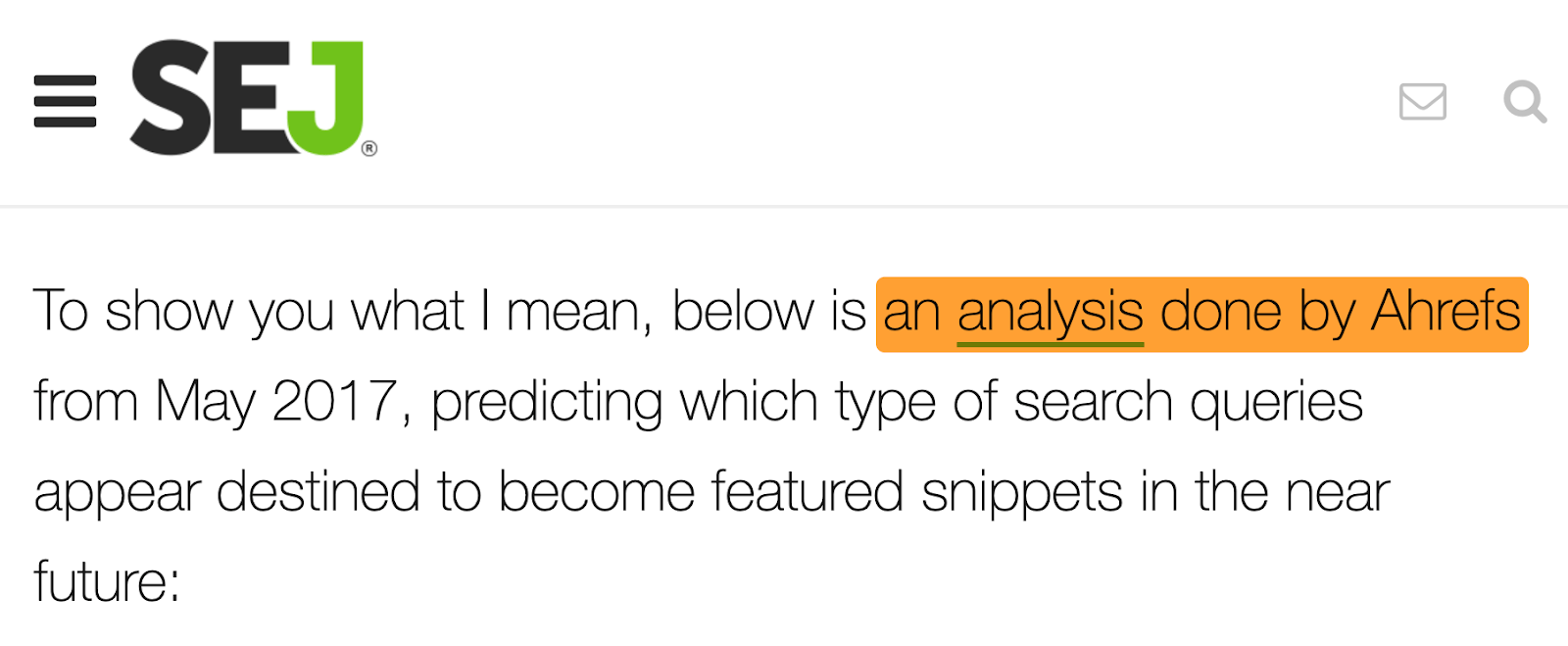
The second is to use a service like HARO to connect with journalists.
Final thoughts
E-A-T is important for SEO, and it’s something that you should work to improve—especially if you cover YMYL topics.
Doing this is a two-part process.
- Be legit. Hire experts. Care about your customers. Do real company stuff. Have values.
- Work to demonstrate your expertise and values to Google.
It sounds simple, and it is; it just takes some time and effort.
If that sounds annoying, remember that Google doesn’t owe you a living. Having a website doesn’t necessarily mean you deserve to rank. If there’s better, more authoritative content out there, or competitors with better products or services, then Google will, quite rightly, try to send traffic their way—not yours.
Potentially unwanted and patronizing moral guidance aside, it’s also worth noting that Google changes their Rater Guidelines frequently, so E-A-T criteria is likely to change and evolve over time.
Got questions? Got ideas? Ping me on Twitter.




